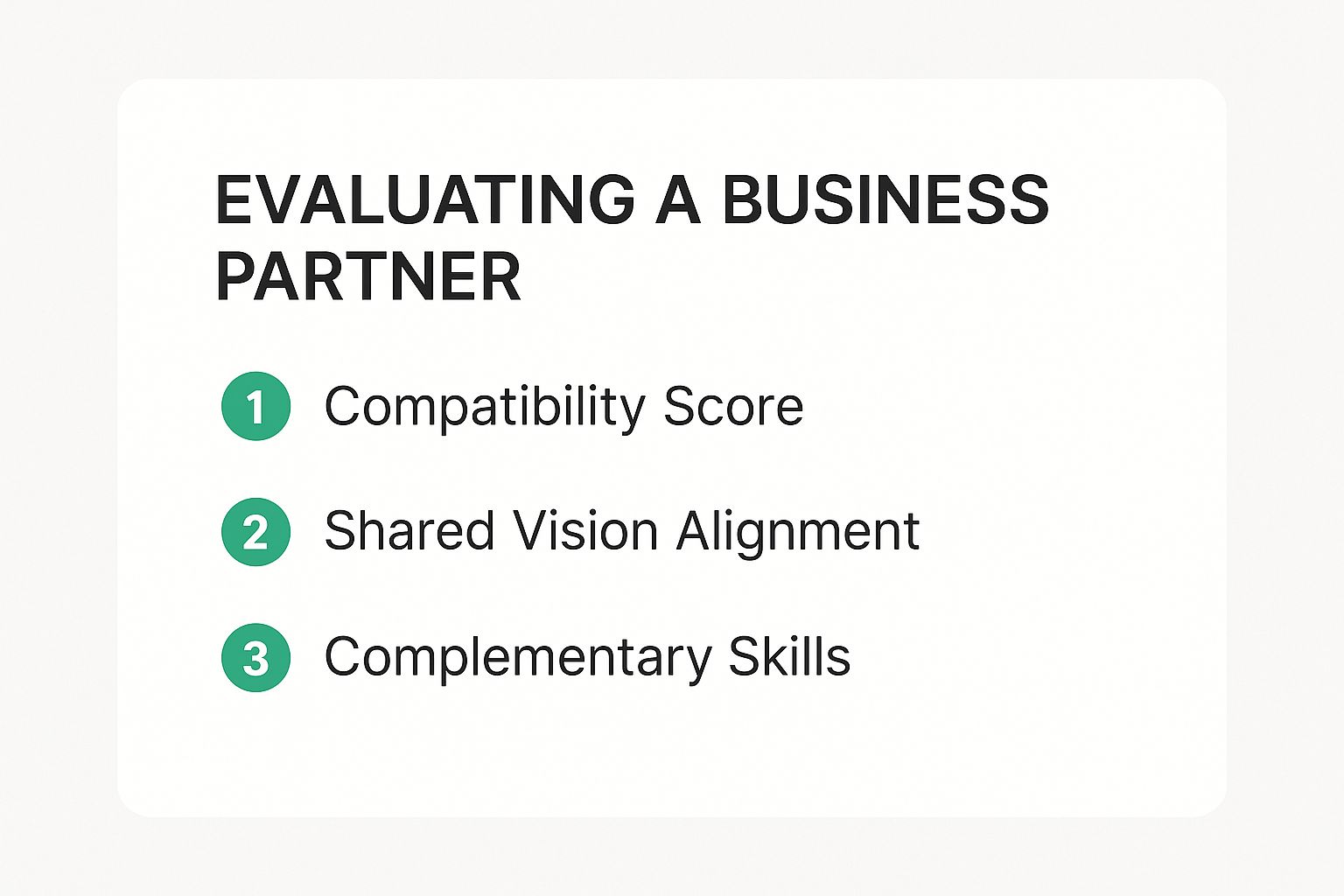Before you can even think about finding a business partner, you need to get brutally honest with yourself. This isn't about writing a generic wish list; it's about a deep, candid look at your own skills, values, and—most importantly—your blind spots. This self-assessment is the single most critical step, acting as your compass for finding a co-founder who truly completes the picture, not just mirrors it.
Defining Your Ideal Co-Founder

The search for the right partner doesn't start on LinkedIn or at a networking event. It starts with you. I've seen countless founders rush this part, and it almost always leads to friction and failed ventures later on. Before you can properly evaluate anyone else, you have to know yourself inside and out.
Start with a simple inventory. What are you truly exceptional at? Maybe it’s product development, sales, or operations. Now, where are your biggest gaps? Admitting you’re lost when it comes to financial modeling or that long-term strategy isn’t your strong suit isn't a failure. It’s a strategic insight that tells you exactly what to look for in a partner.
Build a Partner Role Scorecard
This is where you get specific. Forget a vague list of "must-haves" and build a "Partner Role Scorecard." This simple tool forces you to turn those fuzzy ideas into concrete, non-negotiable requirements. By mapping your strengths against the business's needs, you can clearly define what your ideal partner must bring to the table. This transforms the search from a game of chance into a targeted mission.
Here’s a simple scorecard you can adapt. It’s designed to help you organize your thoughts and pinpoint the exact skills and traits you need.
Partner Role Scorecard Example
| Attribute Category |
Essential Skills/Traits |
My Strengths |
Ideal Partner Strengths |
| Technical/Product |
Product vision, UI/UX design, specific coding languages |
I'm the visionary with deep product expertise. |
Hands-on technical execution, managing the dev team. |
| Sales & Marketing |
B2B sales cycles, content marketing, lead generation |
I'm comfortable with marketing strategy. |
Proven track record closing 6-figure deals, strong industry network. |
| Operations/Finance |
Financial modeling, fundraising, legal, HR |
Basic understanding of budgeting. |
Expertise in creating financial models, has fundraising experience. |
| Values & Vision |
Work ethic, risk tolerance, long-term exit goals |
High-risk tolerance, bootstrap-focused. |
Shares a similar work ethic and vision for a lean company. |
This scorecard becomes your guide. For a deeper dive into structuring these responsibilities, check out our guide on defining co-founder roles.
Align on Mission and Values
Skills get the work done, but shared values make the partnership last. A partner who can code circles around you but has a completely different vision for the company's culture is a recipe for disaster. The days of purely transactional business partnerships are over. Today, the strongest founding teams are built on a foundation of trust and shared purpose.
A partnership built on complementary skills but clashing values is destined for conflict. Your goal isn't to find a clone of yourself, but rather a counterpart who shares your fundamental beliefs about how to build a company and treat people.
Nailing this definition phase is non-negotiable. It’s the clarity you need to write a compelling co-founder "job description," ask sharp questions in interviews, and confidently spot the person who is genuinely the missing piece of your startup puzzle.
Sourcing Your Future Business Partner
Now that you have a crystal-clear picture of who you're looking for, it's time to get out there and find them. And let's be clear: sitting back and waiting for the perfect person to fall into your lap isn't a strategy. It's a recipe for failure. To find a co-founder who genuinely checks all the boxes on your scorecard, you need to be intentional and hunt across multiple channels. Simply asking a few friends for referrals isn't going to cut it. A multi-channel search is the only way to build a deep pool of high-caliber candidates.
Of course, your existing network is the most logical place to kick things off. Think about impressive former colleagues, mentors who've guided you, or even sharp people you collaborated with on past projects. These relationships come with a built-in layer of trust, which is a huge advantage. But don't let that comfort zone become a cage. The real power move is to turn your entire professional network into a search party by being incredibly clear about what you're building and the exact profile of the person you need beside you.
Tap into Digital and Physical Hubs
The best potential co-founders aren't hiding; they're active and engaged in specific communities. Your job is to figure out where they hang out, both online and in the real world. This takes targeted effort.
- Industry Events & Meetups: Get yourself to conferences, trade shows, and local meetups in your space. The goal isn't to just collect a stack of business cards. It's about having real conversations, sharing your vision, and listening for that spark of shared passion and expertise in others.
- Startup Incubators and Accelerators: These places are absolute goldmines—concentrated hubs of ambitious, pre-vetted entrepreneurs. Even if you're not in a program, their public demo days and networking events are prime hunting grounds.
- Co-founder Matching Platforms: Believe it or not, specialized platforms exist just to solve this exact problem. For a deep dive into the best ones, our guide on finding a business partner breaks down several options that actually work.
Use Professional Networks Strategically
LinkedIn is so much more than a place to park your resume. It's a ridiculously powerful sourcing tool if you know how to use it. Sending generic, copy-paste outreach messages is a waste of everyone's time. Your approach has to be personal, sharp, and show you've done your homework.
One of the most effective—and surprisingly overlooked—strategies is digging into university alumni networks. For instance, you can use LinkedIn's alumni search tool to pinpoint graduates from specific programs who have precisely the skills you're missing.
This feature lets you filter through thousands of professionals by where they work, what they do, and what they studied. Instantly, you have a pre-qualified list. A warm message that mentions your shared alma mater can dramatically boost your response rate. It's a simple, human touch that cuts through the noise.
Crafting that first outreach message is an art. Keep it brief. Clearly state your vision, the specific role you need to fill, and—most importantly—why you think they are a great potential fit. This shows you're not just spamming but have taken the time to understand their background.
At the end of the day, finding a co-founder is a proactive sales process. You're not just filling a role; you're selling a vision and a massive opportunity. By diversifying your channels and personalizing your outreach, you shift from hoping to find the right person to systematically discovering them.
How to Properly Vet a Potential Partner

So, you’ve found someone who seems like a great fit. The initial conversations went well, and you're feeling a good vibe. That's a fantastic start, but don't pop the champagne just yet. This is where the real work begins.
You now have to move past first impressions and into a methodical vetting process. Think of it less like a friendly chat and more like due diligence. A structured approach here is your best defense against the kind of catastrophic conflicts that sink startups. You need to gather hard evidence to ensure you find a business partner who is genuinely right for the long haul.
Design a Structured Interview Process
A great interview isn't about getting the "right" answers; it's about seeing how someone thinks. You need to move beyond the generic "what are your strengths?" questions and dig deeper with prompts that reveal their character and problem-solving skills in action.
I recommend a mix of question types to get a full picture:
- Behavioral Questions: Ask about their past experiences. "Tell me about a major professional disagreement you had with a colleague. How did you navigate it, and what was the outcome?" This shows you their real-world conflict-resolution style, not just their theoretical one.
- Situational Questions: Put them on the spot with a hypothetical. "Imagine our main customer acquisition channel just collapsed. We have a tiny budget and one week to turn things around. What are your first three moves?" This tests their ability to think on their feet under pressure.
- Skills-Based Questions: Get practical. If you need a tech co-founder, have them review a small piece of code. If they’re a marketing guru, ask for a quick critique of your current landing page.
This isn't just about technical or business skills anymore. Today's partnerships are increasingly built on shared values. Big brands are pouring money into partnerships centered on social equity and sustainability, proving that alignment on core principles is a business asset. As you vet, their commitment to these values is just as important as their resume. You can learn more about these partnership trends for 2025 on formomentum.com.
Run a Time-Boxed Trial Project
Interviews are great, but the absolute best way to see if you can work together is to actually work together.
Set up a small, well-defined "trial project." This should be a paid, short-term contract with a clear deadline, usually one to two weeks. This isn't about getting free labor; it's a paid simulation of your future working relationship.
A trial project is the ultimate litmus test. It shifts the dynamic from theoretical to practical, revealing work habits, communication styles, and performance under pressure in a way no interview ever could.
The project needs to be a real task that adds some value but is self-contained. For instance, you could ask them to build a simple feature prototype, draft a three-month marketing plan, or put together a detailed financial forecast.
Conduct In-Depth Reference Checks
Last but not least, do not skip the reference checks. And please, don't just accept a curated list of their best friends. You need to dig deeper. Ask to speak with former managers, direct reports, and peers if you can.
When you get them on the phone, ask probing questions that go beyond "Were they a good employee?"
Try asking questions like:
- What would you say is their single biggest professional strength?
- What's an area where they have the most room for growth?
- How do they typically respond to receiving critical feedback?
This kind of systematic vetting helps take the emotion out of the decision. It allows you to make one of the most critical choices for your company based on objective evidence, not just a gut feeling.
So, you’ve found a potential co-founder who seems to check all the boxes. Great. Now comes the hard part—the conversations that will make or break your future partnership.
This is where you move past the "getting to know you" phase and into the nitty-gritty of building a business together. Skipping these talks is a recipe for disaster. Trust me, it’s far better to uncover a deal-breaker now than a year down the line when you’re both miserable and the company is imploding.
Laying Out Roles and Responsibilities
First things first: who is actually going to do what? You can't just slap a "CEO" or "CTO" title on someone and call it a day. That kind of vagueness leads to crossed wires, duplicated work, and eventually, resentment.
You need to get specific about the day-to-day. If you have a technical co-founder, does that mean they’re coding 24/7, managing the product roadmap, and overseeing any freelance developers? If you’re the “business” person, are you handling sales, marketing, investor relations, and bookkeeping? Get it all on the table. A clear division of labor prevents turf wars and ensures nothing critical falls through the cracks.
Talking Money, Goals, and Vision
Once roles are clear, it's time to talk about money. Yes, it can be awkward, but this conversation is absolutely non-negotiable.
You need to tackle financial contributions head-on. Is one of you putting in more cash? Is the other bringing more "sweat equity" to the table? How do you value that? This naturally flows into the equity split discussion. A 50/50 split isn't always the default or the fairest option; it needs to be a thoughtful conversation based on contributions, experience, and commitment.
Be ready to ask some tough questions:
- Initial Capital: How much is each person contributing, and what's the timeline?
- Salaries: When do you plan to start drawing a salary? How will you decide the amount?
- Future Funding: Are you committed to bootstrapping, or will you be chasing angel investors and VCs?
Financial alignment is the bedrock of a resilient startup. As highlighted at the U.S. Chamber of Commerce Global Summit, strong partnerships are critical for navigating economic uncertainty. You can find more details about this on the official summit page. This principle applies just as much to two founders in a garage as it does to global corporations.
The most difficult conversation to have is the one you're avoiding. For founders, this is almost always about money, equity, and a potential exit. Having this talk upfront is a sign of maturity and a prerequisite for a healthy partnership.
This is where you really see if your values, skills, and vision truly align.

Before you even think about drafting a formal agreement, it's essential to have these conversations documented. A simple checklist can ensure you cover all the critical bases and that you're both on the same page.
Pre-Agreement Discussion Checklist
| Topic Area |
Key Questions to Ask |
Points of Agreement |
| Roles & Responsibilities |
Who is the final decision-maker for product? For marketing? What are the top 3 priorities for each founder in the first 6 months? |
Clearly defined operational domains and tie-breaker protocols. |
| Time & Commitment |
How many hours per week is each founder committing? What's the plan if one founder needs to reduce their hours? |
Agreed-upon weekly hours and a process for handling changes in availability. |
| Financial Contributions |
How much capital is each founder contributing? How will "sweat equity" be valued? |
Documented capital and non-capital contributions. |
| Compensation |
At what revenue milestone will we begin taking salaries? How will salary amounts be determined? |
A clear, milestone-based plan for founder compensation. |
| Equity & Vesting |
What is the equity split? What is the vesting schedule (e.g., 4-year with a 1-year cliff)? |
Agreed-upon equity percentages and a standard vesting schedule. |
| Exit Strategy |
What are our long-term goals (acquisition, IPO, lifestyle business)? What happens if one founder wants to leave? |
Aligned vision for the company's future and a defined buyout process. |
Using a checklist like this turns abstract discussions into concrete points of agreement. It forms the foundation for your eventual legal documents and, more importantly, a relationship built on transparency.
Planning for the End, From the Beginning
It might sound strange, but you have to talk about how it all ends. What happens if one of you wants out? It’s not pessimistic; it’s pragmatic. Life happens—health issues, family emergencies, or just a fundamental change of heart.
Planning for this now, with a clear buyout clause or vesting schedule in your future founder's agreement, is a lifesaver. It ensures that if a departure happens, it's an orderly and fair process that protects both the individual and the company. By tackling these tough subjects upfront, you’re not just finding a co-founder; you’re building a partnership that can actually withstand the pressures of the real world.
Making It Official with a Founders Agreement
You’ve done the hard work. After all the interviews, trial projects, and tough conversations, you’ve finally found someone who gets it—someone who shares your vision. It's a huge milestone.
But a simple handshake and a "we're in this together" is exactly where many promising partnerships start to fall apart. To protect your new venture and your relationship, you have to make it official with a legally binding founders' agreement.
This document isn’t about planning for failure; it’s about creating a professional framework for success. Think of it as the rulebook that will govern your partnership, giving you clarity and preventing the kinds of misunderstandings that can kill a company from the inside out. Without one, you’re just operating on assumptions—a massive and unnecessary risk.
Core Components of a Strong Agreement
A solid founders' agreement is the legal backbone of your company. It’s your constitution. While every agreement needs to be tailored to your specific situation, there are several non-negotiable clauses that absolutely must be in there to protect everyone involved.
At a minimum, you’ll need to cover:
- Equity Distribution and Vesting: This spells out exactly who owns what percentage of the company. Critically, this equity should be tied to a vesting schedule—the standard is over four years with a one-year "cliff." This structure ensures founders have to stick around for a set period to earn their full ownership, protecting the business if someone decides to leave early.
- Roles and Responsibilities: It's time to formalize all those roles you discussed. Clearly define who has the final say in specific areas (like product, finance, or marketing) to prevent future turf wars and create clear accountability.
- Intellectual Property (IP): Any work, ideas, or code created for the business must be legally assigned to the company, not held by an individual founder. This is a crucial clause that ensures the business actually owns its most valuable assets.
- Conflict Resolution: You need to outline a clear, pre-agreed process for what happens when you disagree. This might involve mediation or another structured method for resolving disputes before they escalate to a point of no return.
Why You Cannot Skip the Lawyer
I see this all the time—founders trying to save a few bucks by downloading a generic template online. This is a huge mistake. Every startup is unique, and a one-size-fits-all agreement will inevitably have gaps that leave your business exposed to serious risks. This is one corner you absolutely cannot afford to cut.
Engaging a lawyer who specializes in startups is a critical investment, not an expense. They've seen countless partnerships go wrong and know exactly how to build an agreement that anticipates potential conflicts and protects your shared vision.
A good startup lawyer will ask the tough questions you haven't thought of, and in doing so, they actually strengthen your partnership. They make sure the agreement is fair, comprehensive, and legally sound where you operate. For a much deeper dive into what to include, check out this complete guide to startup co-founder agreements.
Finalizing this document is the last major step when you find a business partner. It’s what transforms a promising relationship into a formal, professional alliance, giving your company the solid legal foundation it needs to actually grow.
Common Questions About Finding a Partner

The journey to find the right co-founder is inevitably paved with tough questions. The answers aren't always black and white, but facing these common dilemmas head-on is what separates a prepared founder from one who's just winging it. Let's walk through some of the most frequent hurdles I see entrepreneurs grapple with.
How Much Equity Should I Give a Business Partner?
Forget about finding a magic formula for splitting equity. While a 50/50 split feels simple and fair on the surface, it’s often a lazy shortcut that doesn’t reflect reality. The final split should come from an honest, detailed conversation about what each person truly brings to the table.
Think about these factors when you're working out a fair structure:
- Initial Capital: Is one of you footing more of the bill to get things off the ground?
- Time Commitment: Is one partner all-in, working full-time, while the other is still contributing on a part-time basis?
- Key Contributions: Does one person bring critical intellectual property, a patent, or a valuable network that immediately gives the startup a massive advantage?
An equal split can work perfectly for partners starting on identical footing, but in my experience, a 60/40 or another custom arrangement is often the smarter, more sustainable choice. What matters most is that both of you feel the arrangement is fair. Get it in writing, and always, always include a vesting schedule in your founders' agreement.
Should I Partner with a Friend or Family Member?
You can, but you have to walk this path with your eyes wide open. The built-in trust can give you a powerful head start, but the risk of blowing up a lifelong personal relationship over business disagreements is incredibly high.
If you go this route, you must be even more disciplined about formalizing the partnership than you would with a stranger.
Treat a friend or family member exactly as you would any other candidate. Put them through a trial project. Have the uncomfortable conversations about money and failure. Draft a comprehensive legal agreement. It’s this professional structure that will ultimately protect your personal bond when things get tough.
What Are the Biggest Red Flags in a Potential Partner?
Some warning signs should stop you in your tracks during the vetting process. Learning to spot them early can save you from a world of conflict and heartache down the road.
Poor communication is probably the biggest one. If a candidate is flaky with responses, vague in their answers, or just struggles to articulate their ideas now, imagine what they’ll be like under the stress of a product launch or a funding round. It only gets worse.
Also, be wary of anyone who seems obsessed with the financial exit before showing any real passion for the business's mission. This often signals they lack the grit for the long, hard journey ahead.
Another huge red flag is a refusal to discuss the hard stuff. If they dodge conversations about equity, potential role conflicts, or what happens if you fail, they aren’t mature enough for a real partnership. Finally, if their references are hesitant or they seem cagey about providing them in the first place, that's a serious problem. Trust your gut, but make sure you back it up with objective evidence from your vetting process.
Finding the right co-founder shouldn't feel like a lottery. Platforms like IndieMerger can dramatically speed up your search by connecting you with verified founders who have the exact complementary skills you need. Start building your startup dream team today.